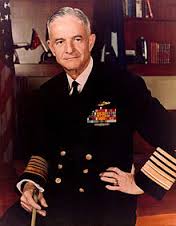Get Today in Masonic History into your Inbox. Sign up today for one of our email lists!
Need an article for your Trestleboard/Newsletter see our Use Policy
John Sidney McCain, Jr. Passes Away

Today in Masonic History John Sidney McCain, Jr. passes away in 1981.
John Sidney McCain, Jr. was an American admiral.
McCain was born in Council Bluffs, Iowa. The family did not reside there though, McCain's mother was traveling to see her sisters and on the trip McCain was born. Like many children of Military parents, McCain's father was a Naval Officer, McCain grew up at various Naval Stations. He graduated from Central High School in Washington, D.C.
At the age of 16, McCain entered the United States Naval Academy. McCain eventually graduated from the academy, although he earned many demerits and performed a lot of extra duty. Regarding this McCain said "I was known as a 'ratey' plebe, and that's the plebe who does not conform always to the specific rules and regulations of the upperclassmen. Some of these upperclassmen would ... require you to do such things which only incited rebellion and mutiny in me."
After graduation, McCain was stationed in California on the USS Oklahoma. He tried to become a Naval Aviator and was rejected due to a heart murmur. He was accepted to the Naval Submarine School in Groton, Connecticut.
Before heading back east for Submarine School, McCain met Roberta Wright who was attending college in California. In 1933 the couple eloped to Tijuana, Mexico when Roberta's mother disapproved of their relationship based on the fact McCain was a sailor. The couple had three children their oldest Jean, their youngest Joseph and their middle, and most well known son, John Sidney McCain III who was a United States Senator from Arizona and was an unsuccessful presidental canidate.
At the start of World War II, McCain was given command of the submarine Gunnel. The Gunnel served a brief period in the North Atlantic before being sent to Pearl Harbor to serve in the South Pacific. McCain was well suited, if not better suited for submarine warfare then most of his contemporaries. Many submarine commanders in the south pacific focused on rigid military tactics, where McCain was more apt to improvise as the situation required. This ability served him well, one month obtaining the highest gross tonnage sank and on another occasion he was one of only a handful of United States Submarine Commanders to fire on a Japanese Aircraft Carrier.
After the war, McCain served on several vessels in the Pacific fleet. He was assigned to various posts at the Pentagon, alternating with various sea going commands. In between, McCain visited his son, John III, at the U.S. Naval Academy to chastise his son for performance issues. A biographer once wrote "Few fathers and sons could have been more alike as adolescents than Jack McCain and John Sidney III: Youthful rebellion seemed encoded in their DNA."
While in Washington D.C. McCain and his wife socialized with many important Washington figures. McCain, who in 1958 was promoted to Rear Admiral, was called to testify before Congress on matters regarding the United States Navy. His testimony and his staunch advocacy for better Naval strength earned him the nickname "Mr. Seapower."
In 1968, at the height of the Vietnam War, McCain was named the Commander in Chief, Pacific Command (CINCPAC). He held the position until 1972 when, despite his requests, President Nixon appointed his successor. In September of the same year a transfer of command ceremony was held at Pearl Harbor. The ceremony effectively became his retirement ceremony, McCain retired two months later.
McCain passed away March 22nd, 1981.
McCain was made a Mason On Sight in 1975. He was a member of St. John's Lodge No. 11 and received his 33rd degree.
This article provided by Brother Eric C. Steele.

